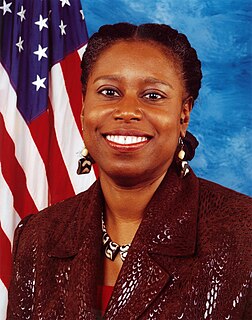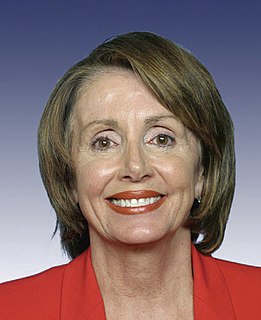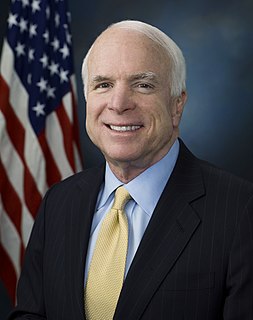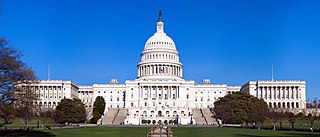
Cynthia Ann McKinney is an American politician and activist currently teaching at North South University, Bangladesh. As a member of the Democratic Party, she served six terms in the United States House of Representatives. She was the first black woman elected to represent Georgia in the House. She left the Democratic Party and in 2008, ran as the presidential candidate of the Green Party of the United States.

Denise Lorraine Majette is an American politician from the state of Georgia. A Democrat, she represented Georgia's 4th congressional district in the United States House of Representatives from 2003 to 2005.

The 2006 United States House of Representatives elections were held on November 7, 2006, to elect members to the United States House of Representatives. It took place in the middle of President George W. Bush's second term in office. All 435 seats of the House were up for election. Those elected served in the 110th United States Congress from January 3, 2007, until January 3, 2009. The incumbent majority party, the Republicans, had won majorities in the House consecutively since 1994, and were defeated by the Democrats who won a majority in the chamber, ending 12 years in opposition.

Henry Calvin Johnson Jr. is the U.S. Representative for Georgia's 4th congressional district, serving since 2007. He is a member of the Democratic Party. The district is based in DeKalb County, a largely suburban county east of Atlanta. It also includes portions of Gwinnett, Newton, and all of Rockdale counties; the district's boundaries have been redrawn, in accordance with the results of the 2010 United States Census, since Congressman Johnson's initial election victory in 2006. He is one of only two Buddhists, along with Hawaii Senator Mazie Hirono) – to serve in the United States Congress.

The 2006 California 11th congressional district election was an election for the United States House of Representatives in California's 11th congressional district. The two major party candidates were longtime Republican incumbent Richard Pombo and Democratic challenger Jerry McNerney. Both faced serious challenges in their respective primaries, on June 6, 2006.
North Carolina elections to choose members of the Council of State were held November 4, 2008. This coincided with the presidential, U.S. Senate, U.S. House, gubernatorial, and statewide judicial elections.
Georgia's state elections will be held on November 4, 2008. The primary elections were held on February 5, also known as Super Tuesday.

The 2008 United States presidential election in Georgia took place on November 4, 2008. Voters chose 15 representatives, or electors to the Electoral College, who voted for president and vice president.

Elections were held on November 2, 2010 to determine North Carolina's 13 members of the United States House of Representatives. Representatives were elected for two-year-terms to serve in the 112th United States Congress from January 3, 2011 until January 3, 2013. Primary elections were held on May 4, 2010 and primary runoff elections were held on June 22, 2010.
The 1973 Atlanta mayoral election was held on October 16, 1973 in Atlanta, Georgia. Vice Mayor Maynard Jackson was elected as the city's first African-American mayor, defeating incumbent Mayor Sam Massell.

Elections were held on November 2, 2010, to determine Georgia's 13 members of the United States House of Representatives. Representatives were elected for two-year terms to serve in the 112th United States Congress from January 3, 2011, until January 3, 2013. Primary elections were held on July 20, 2010, and primary runoff elections were held on August 10, 2010.

Elections were held on November 2, 2010 to determine Maine's two members of the United States House of Representatives. Representatives were elected for two-year terms to serve in the 112th Congress from January 3, 2011 until January 3, 2013. Primary elections were held on June 8, 2010.

Elections were held on November 2, 2010 to determine Utah's three members of the United States House of Representatives. Representatives were elected for two-year terms to serve in the 112th United States Congress from January 3, 2011 until January 3, 2013. Primary elections were held on June 22, 2010.

Elections were held on November 2, 2010 to determine Louisiana's seven members of the United States House of Representatives. Representatives were elected for two-year terms to serve in the 112th United States Congress from January 3, 2011 until January 3, 2013. Primary elections were held on August 28, 2010, and a runoff election for the Republican Party nomination in the 3rd district took place on October 2, 2010.
The 2012 United States House of Representatives elections in Georgia were held on Tuesday, November 6, 2012, and elected the 14 U.S. Representatives from the state, one from each of the state's 14 congressional districts, an increase of one seat following the 2010 United States Census. The elections coincided with the elections of other federal and state offices, including a quadrennial presidential election. The party primary elections were held July 31, 2012, and the run-off on August 21, 2012.
The 2014 United States House of Representatives elections in Georgia were held on Tuesday, November 4, 2014, to elect the 14 U.S. Representatives from the state of Georgia, one from each of the state's 14 congressional districts. The elections coincided with the elections of other federal and state offices, including Governor of Georgia and U.S. Senator.

The 2016 United States House of Representatives elections in Texas were held on November 8, 2016, to elect the 36 U.S. Representatives from the State of Texas, one from each of the state's 36 congressional districts. The elections coincided with the 2016 U.S. presidential election, as well as other elections to the House of Representatives, elections to the United States Senate and various state and local elections. The primaries were held on March 1.

A special election to determine the member of the United States House of Representatives for Georgia's 6th congressional district was held on April 18, 2017, with a runoff held two months later on June 20. Republican Karen Handel defeated Democrat Jon Ossoff in the runoff vote, 51.8% to 48.2%. Handel succeeded Tom Price, who resigned from the seat following his confirmation as United States Secretary of Health and Human Services in the Trump Administration. The runoff election was necessary when no individual candidate earned the majority of votes in the election on April 18. Ossoff received 48.1% of the vote in the first round, followed by Handel with 19.8%.

Thomas Jonathan Ossoff is an American documentary filmmaker and politician. He is a member of the Democratic Party. He was a finalist in the 2017 special election in Georgia's 6th congressional district.























